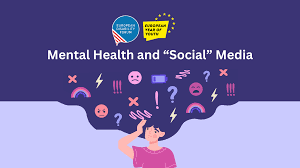Social Media and Mental Health: The Hidden Connection and How to Protect Your Well-being
Introduction: The Double-Edged Sword of Social Media
In the last decade, social media has revolutionized the way we communicate, share, and consume information. Platforms like Instagram, Facebook, TikTok, and Twitter keep us connected, informed, and entertained. But beneath the surface of likes, shares, and viral trends lies a growing concern—the impact of social media on mental health.
While it helps people stay connected, excessive use has been linked to anxiety, depression, loneliness, and low self-esteem. A study by the American Psychological Association (APA) found that heavy social media users report higher stress levels than those who use it moderately. Another report from the Royal Society for Public Health (RSPH) ranked Instagram as the worst platform for mental health, particularly among young users.
So, how exactly does social media affect our minds? And more importantly—how can we use it in a way that benefits rather than harms us?
Let’s dive deep into the psychological effects of social media, backed by research, and explore practical strategies to maintain a healthy digital balance.
How Social Media Rewires Our Brain (The Psychology Behind the Scroll)
Social media platforms are designed to keep us engaged for as long as possible. They exploit psychological triggers like:
- Dopamine-driven feedback loops (Likes, comments, shares create instant gratification)
- Fear of Missing Out (FOMO) (Seeing others’ highlight reels makes us feel left out)
- Social comparison theory (We compare our lives to others’ curated perfection)
The Dark Side of Social Media: 5 Key Mental Health Risks
- Increased Anxiety & Depression
- Studies show a strong correlation between heavy social media use and mood disorders.
- Constant exposure to negative news, cyberbullying, and unrealistic beauty standards fuels stress.
- Lower Self-Esteem & Body Image Issues
- Platforms like Instagram promote filtered realities, making users feel inadequate.
- A 2023 study found that 87% of women and 65% of men compare themselves to edited images online.
- Sleep Disruption & Digital Fatigue
- Blue light from screens suppresses melatonin, disrupting sleep cycles.
- Late-night scrolling leads to poor sleep quality, affecting mood and productivity.
- Addiction & Decreased Real-Life Social Skills
- The “infinite scroll” feature keeps users hooked, reducing face-to-face interactions.
- Heavy users report higher loneliness despite being “connected” online.
- Cyberbullying & Online Harassment
- 42% of teens have experienced cyberbullying, leading to anxiety and suicidal thoughts (Pew Research).
Who is Most Vulnerable to Social Media’s Negative Effects?
While social media impacts everyone, some groups are at higher risk:
✔ Teenagers & Young Adults – Their brains are still developing, making them more susceptible to peer pressure and validation-seeking behaviors.
✔ People with Pre-existing Mental Health Conditions – Social media can amplify symptoms of anxiety, depression, and OCD.
✔ Those with Low Self-Esteem – Constant comparison deepens feelings of inadequacy.
✔ Professionals with High-Stress Jobs – Doomscrolling (obsessively consuming negative news) increases burnout.
How to Use Social Media Without Sacrificing Mental Health
Step 1: Audit Your Social Media Habits
- Track your screen time (Settings > Digital Wellbeing on Android / Screen Time on iPhone).
- Identify which apps drain your energy and which add value.
Step 2: Cleanse Your Feed
- Unfollow toxic accounts (those promoting negativity or unrealistic standards).
- Follow uplifting pages (mental health advocates, educational content, humor).
Step 3: Set Boundaries
- Use app timers (e.g., limit Instagram to 30 minutes/day).
- Turn off notifications to avoid constant distractions.
- Implement a “No-Phone” rule 1 hour before bed.
Step 4: Engage Mindfully
- Avoid passive scrolling—interact with purpose (comment, share, learn).
- Schedule social media breaks (e.g., weekends off or a full digital detox).
Step 5: Replace Screen Time with Real-Life Activities
- Exercise, hobbies, and in-person meetups boost serotonin naturally.
- Practice mindfulness (meditation, journaling) to reduce digital anxiety.
When to Seek Professional Help
If social media is severely affecting your mental health, consider:
🔹 Therapy (CBT or DBT) – Helps manage anxiety and compulsive behaviors.
🔹 Support Groups – Online/offline communities for digital wellness.
🔹 Mental Health Apps – Headspace (meditation), Woebot (AI therapy), Talkspace (online counseling).
Final Thoughts: Finding Balance in a Hyper-Connected World
Social media isn’t inherently bad—it’s how we use it that matters. By setting boundaries, curating positive content, and prioritizing real-life connections, we can enjoy its benefits without falling into the mental health pitfalls.
What’s your relationship with social media like? Have you tried a digital detox? Share your experiences in the comments!
FAQs: Quick Answers to Common Concerns
Q: Can quitting social media improve mental health?
A: For some, a break helps, but moderation is key. You don’t have to quit—just use it mindfully.
Q: How much social media use is healthy?
A: 30-60 minutes per day is ideal, but quality matters more than quantity.
Q: What are signs of social media addiction?
A: Constantly checking apps, neglecting responsibilities, feeling anxious when offline.
By implementing these strategies, you can reclaim control over your digital life and protect your mental well-being.Remember: Your mind is more important than your feed.
